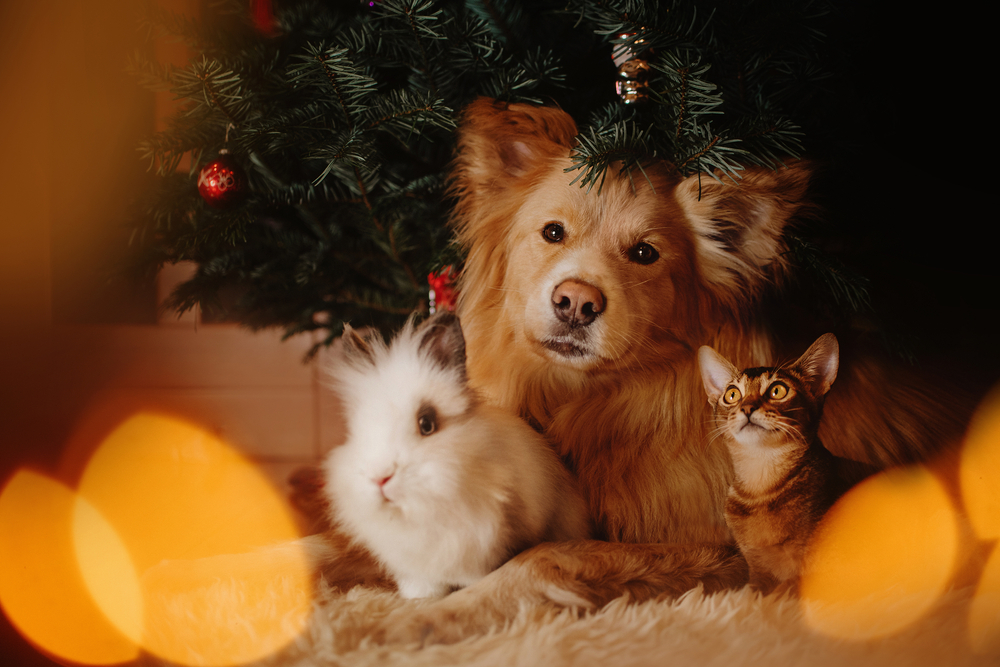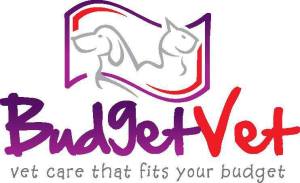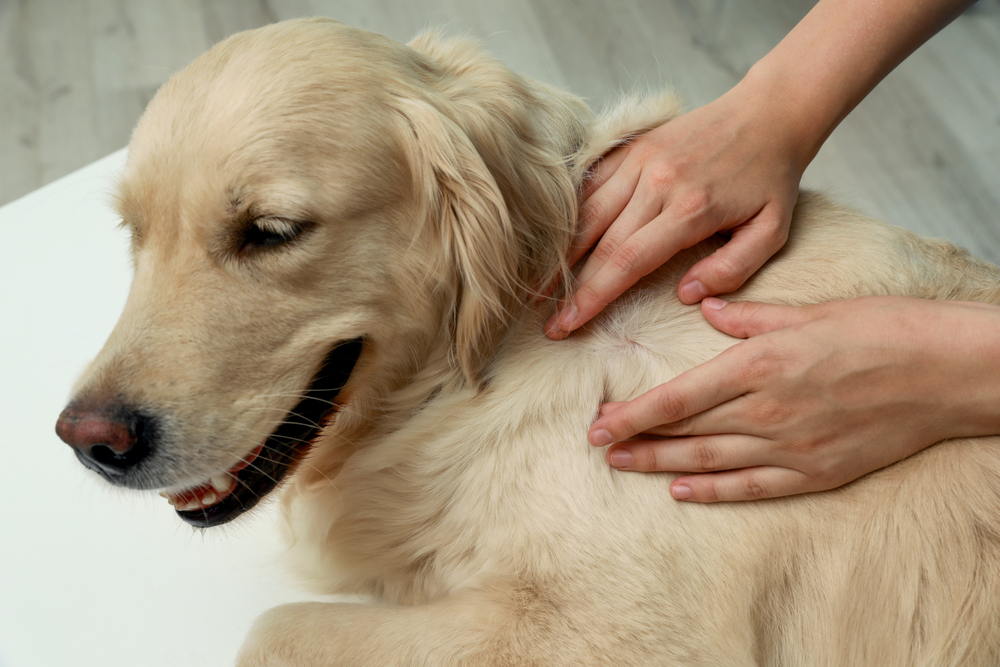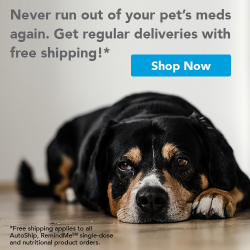
As the holiday season approaches, many pet owners wonder what festive treats they can share with their four-legged friends. Yet, it’s crucial to remember that some foods we love can be hazardous for our pets.
This article will guide you through a list of common holiday foods and items that can pose a danger to your furry companions. Let’s make sure our celebrations are safe for everyone in the household!
Dangerous Holiday Foods for Pets
Many holiday foods can be dangerous for pets, including fatty foods, chocolate, grapes and raisins, sugar-free candies and pastries, onions and garlic, meat bones, and alcohol.
Fatty foods
Fatty foods lure many a snout during the holiday season. However, indulging your pets in these rich delights can lead to significant health issues. Dogs and cats don’t process fats as efficiently as humans do.
Giving them scraps from your Christmas ham or turkey can cause upset stomachs, diarrhea, and even worse – pancreatitis. Pancreatitis is an inflammation of the pancreas that results in pain and vomiting; it’s not a festive time for anyone involved.
So while those begging eyes may be hard to resist, you’re doing what’s best for your pet by keeping fatty foods out of their reach.
Chocolate
Chocolate is a delicious treat for humans, but it can be extremely dangerous for our furry friends. This tempting sweet contains theobromine and caffeine, which are toxic to dogs and cats.
Even small amounts of chocolate can cause symptoms such as vomiting, diarrhea, increased heart rate, seizures, and even death. It’s important to keep all forms of chocolate out of reach from your pets during the holiday season.
Make sure to educate your houseguests about this hazard as well so that they don’t unknowingly give your pet any chocolate treats. Keep your fur babies safe by sticking to pet-friendly alternatives when it comes to indulging in sweets during the holidays.
Grapes and raisins
Grapes and raisins may be a delicious snack for us, but they can be extremely dangerous for our furry friends. These fruits are toxic to dogs and can cause kidney failure. Even small amounts of grapes or raisins can lead to serious health problems, such as vomiting, diarrhea, abdominal pain, and increased thirst.
It’s important to keep these foods out of your pet’s reach and avoid giving them any treats that contain grapes or raisins during the holiday season. Remember to always check ingredient labels carefully before sharing food with your pets.
Sugar-free candies and pastries
Sugar-free candies and pastries might seem like a safe alternative for your pet, but they can actually be harmful. These treats often contain an artificial sweetener called xylitol, which is extremely toxic to dogs.
Xylitol can cause a rapid release of insulin in dogs, resulting in dangerously low blood sugar levels. This can lead to symptoms like vomiting, loss of coordination, seizures, and even liver failure.
It’s important to keep all sugar-free candies and pastries away from your pet and opt for pet-friendly treats instead.
Onions and garlic
Onions and garlic may add flavor to our favorite dishes, but they can be harmful to our pets. These ingredients contain a substance called thiosulphate, which can damage a pet’s red blood cells and lead to a condition called hemolytic anemia.
This can cause symptoms such as weakness, vomiting, diarrhea, and even breathing difficulties in severe cases. So when preparing your holiday meals or snacks, make sure to keep onions and garlic away from your furry friends to protect their health.
Meat bones
Meat bones may seem like a special treat for your pet, but they can actually be quite dangerous. Dogs have a natural instinct to chew on bones, but it’s important to know that certain types of bones can splinter and cause serious harm.
Cooked bones, especially those from poultry or fish, are prone to breaking into sharp pieces that can puncture the digestive tract or get stuck in your pet’s throat. This can lead to choking, internal injuries, or even require surgery to remove the bone fragments.
To keep your furry friend safe this holiday season, it’s best to avoid giving them meat bones altogether.
Alcohol
Alcohol is extremely dangerous for pets and should be kept far away from them during the holiday season. Even small amounts of alcohol can have serious effects on animals, including vomiting, diarrhea, difficulty breathing, and even coma or death.
Pets are much more sensitive to the toxic effects of alcohol than humans, so it’s important to make sure they do not have access to any alcoholic beverages. Keep an eye out for spilled drinks and empty cups that your pet may try to lick or drink from.
If you suspect that your pet has ingested alcohol or is showing signs of intoxication, contact your veterinarian immediately for guidance and assistance.
Harmful Holiday Items for Pets
Poinsettias, lilies, mistletoe, and candles can all pose dangers to your furry friends. Keep reading to learn how to keep your pets safe during the holidays!
Poinsettias
Poinsettias may add a festive touch to your holiday decorations, but they can be harmful to your pets if ingested. These beautiful plants contain a milky sap that can cause stomach irritation and vomiting in cats and dogs.
It’s important to keep poinsettias out of reach from your furry friends or consider choosing pet-friendly alternatives for your holiday decor.
Lilies
Lilies may be beautiful flowers, but they can be extremely dangerous for pets, especially cats. All parts of the lily plant are toxic to cats, including the petals, leaves, stems, and even the water in a vase.
If ingested, lilies can cause severe kidney damage and failure in cats within just a few days. Symptoms of lily poisoning include vomiting, loss of appetite, lethargy, and increased thirst or urination.
It’s important to keep your pets away from all types of lilies to ensure their safety during the holiday season and beyond.
In addition to avoiding giving your pet any lilies as gifts or decorations in your home, make sure to also inform friends and family members who may have pets about the dangers of these flowers.
Holly
Holly is a popular holiday plant, but it can be hazardous to your pets. The berries of holly contain substances that are toxic to both dogs and cats if ingested. Symptoms may include vomiting, diarrhea, and difficulty breathing.
It’s important to keep holly plants out of reach from your furry friends during the holiday season to prevent any accidents or illnesses.
Mistletoe
Mistletoe is a popular holiday decoration, but it can be harmful to pets if ingested. The berries and leaves of mistletoe contain toxins that can cause gastrointestinal upset in dogs and cats.
If you have mistletoe in your home, make sure to hang it high up where your pet can’t reach it, or consider using artificial mistletoe instead. Keep an eye on your pet during holiday gatherings to ensure they don’t get into any potentially hazardous plants or decorations.
Candles
Candles can create a cozy and festive atmosphere during the holiday season, but they can also pose a hazard to your pets. Keep in mind that curious cats or dogs may accidentally knock over candles, resulting in burns or even fires.
To prevent any accidents, make sure to place candles in secure holders on high surfaces that are out of reach for your furry friends. It’s also a good idea to opt for flameless LED candles as a safer alternative.
Christmas trees
Christmas trees can pose a potential hazard to our furry friends. The tree itself, with its needles, sap, and water additives, can cause digestive issues if ingested by pets. It’s important to secure the tree properly so that it doesn’t topple over if your pet decides to investigate or play with it.
Additionally, be cautious of any ornaments or decorations that could be easily knocked off and become a choking hazard for your pet. Keep an eye on them around the Christmas tree to ensure their safety during the holiday season.
Ornaments and snow globes
Ornaments and snow globes can be a source of temptation for curious pets during the holiday season. The shiny, dangling ornaments and glittery snow globes may catch their attention, but they can pose significant risks if ingested.
Pets chewing on or playing with these decorations can lead to choking hazards or intestinal blockages. It’s important to keep fragile ornaments out of reach and secure any snow globes that contain toxic substances, like ethylene glycol, away from your furry friends.
Tinsel, string, and ribbons
Tinsel, string, and ribbons may seem harmless, but they can pose a serious risk to your pets during the holiday season. Cats, in particular, are attracted to these shiny objects and love to play with them.
However, if ingested, tinsel and strings can cause intestinal blockages or even strangulation. It is crucial to keep these decorations out of reach from your pets at all times. Be sure to secure your Christmas tree ornaments properly and dispose of any broken or loose pieces immediately.
Other Hazards for Pets During the Holidays
Pets face other hazards during the holidays, such as houseguests, fireplaces, electrical cords, cleaning supplies, rock salt, and antifreeze. Discover how to keep your furry friends safe this holiday season.
Houseguests
Houseguests can bring about added excitement and activity in your home during the holiday season. While it’s great to have friends and family over, it’s important to consider how your pets will react to these new visitors.
Some pets may feel anxious or overwhelmed by the presence of houseguests, so it’s crucial to create a safe and calm environment for them. Make sure to provide a quiet space where they can retreat when things get too chaotic.
Additionally, remind your guests not to feed any table scraps or treats to your pets without consulting you first, as some foods can be harmful or toxic to animals. By taking these precautions, you can help ensure that both your pets and houseguests have an enjoyable time together during the holidays.
Fireplaces
Keep your pets safe by taking precautions around fireplaces during the holiday season. Ensure that the fireplace is properly screened or blocked off to prevent accidental burns. Supervise your pets when they are near the fireplace to avoid any accidents or injuries.
Remember, a cozy fire may be tempting for your furry friends, but it’s important to keep them at a safe distance from the flames and hot surfaces.
Electrical cords
Ensure the safety of your furry friends during the holidays by being mindful of electrical cords. Pets can be curious and may chew on loose cords, posing a risk for electric shocks or even burns.
Keep cords out of their reach and consider utilizing cord covers or deterrent sprays to prevent any accidents. Regularly check your electrical cords for any signs of damage, such as fraying or exposed wires, and replace them if necessary.
By taking these precautions, you can help create a safe environment for your pets during the holiday season.
Cleaning supplies
Cleaning supplies can be hazardous for pets, so it’s important to keep them out of reach. Many household cleaners contain chemicals that can be toxic if ingested by your furry friend.
Bleach, ammonia, and disinfectants are just a few examples of cleaning products that should be stored securely. Even when using these products, make sure to keep your pet in a separate area to prevent accidental exposure.
It’s always best to opt for pet-friendly cleaning alternatives or natural solutions to ensure the safety of your beloved pet during the holiday season and beyond.
Rock salt
Rock salt is commonly used during the winter months to melt ice and snow on sidewalks and driveways. While it may be effective in creating traction, it can pose a danger to your pets.
Rock salt contains chemicals that can irritate their paws, causing discomfort and potential injury. It’s important to avoid areas where rock salt has been spread or take precautions such as using pet-friendly alternatives like sand or non-toxic ice melts.Cleaning your pet’s paws after being outside can also help remove any residual rock salt and prevent them from ingesting it when they groom themselves.
By being mindful of the use of rock salt, you can keep your furry friends safe during the holiday season.
Antifreeze
Antifreeze is a hazardous substance that poses a significant risk to pets during the holiday season. It contains ethylene glycol, which can be fatal if ingested by dogs or cats. The sweet taste of antifreeze attracts curious animals, but even a small amount can cause kidney failure and other serious health problems.
It is crucial to store antifreeze securely and clean up any spills immediately. If you suspect your pet has ingested antifreeze, seek veterinary assistance right away to ensure their safety.
How to Keep Your Pets Safe During the Holidays
To keep your pets safe during the holidays, make sure to avoid giving them dangerous foods, keep harmful items out of their reach, create a safe and calm environment, consider pet-friendly alternatives, and contact a veterinarian in case of an emergency.
Avoid giving them dangerous foods
Keep your pets safe during the holiday season by avoiding giving them dangerous foods. Indulging in rich and fatty foods can be harmful to your pets, causing digestive issues and even pancreatitis.
Make sure to keep chocolate, grapes, raisins, sugar-free candies, onions, garlic, and meat bones out of their reach as these can be toxic for them. It’s best to stick to pet-friendly treats and consult with your veterinarian about what is safe for your furry friend to enjoy during this festive time.
Keep harmful items out of reach
To keep your pets safe during the holidays, it’s crucial to keep harmful items out of their reach. This includes things like holiday decorations, such as poinsettias, lilies, holly, mistletoe, candles, ornaments, snow globes, and tinsel.
These items can be attractive to pets but can also pose serious health risks if ingested. It’s important to securely place them in areas where your furry friends cannot access them.
By doing so, you’ll minimize the chances of accidents or potential poisonings and ensure a happy and healthy holiday season for your beloved pets.
Create a safe and calm environment
Ensure the safety and well-being of your pets during the holiday season by creating a safe and calm environment for them. Eliminate any potential hazards from their surroundings, such as toxic plants, lit candles, and fragile ornaments that they could knock over or ingest.
Keep doors to tempting rooms closed and consider using baby gates to restrict access to certain areas. Provide a designated quiet space where your pet can retreat when things get too noisy or overwhelming.
By taking these precautions, you can help keep your furry friends happy and stress-free throughout the holidays.
Consider pet-friendly alternatives
Instead of giving your pets harmful holiday foods, consider offering them pet-friendly alternatives. Instead of fatty foods, opt for lean meats or vegetables that are safe for pets to consume.
Instead of chocolate, which is toxic for dogs and cats, treat them to carob-based treats or toys. Instead of grapes and raisins, give them apple slices or strawberries as a tasty snack.
Instead of sugar-free candies and pastries that may contain xylitol, which is poisonous to pets, offer them natural treats made specifically for animals. By considering pet-friendly alternatives, you can ensure that your furry friends have a safe and enjoyable holiday season without compromising their health.
Contact a veterinarian in case of emergency
If your pet shows any signs of distress or illness during the holiday season, it is crucial to contact a veterinarian immediately. Time is of the essence when it comes to emergencies, so don’t hesitate to reach out for professional help.
Whether your pet has ingested something harmful or is exhibiting unusual symptoms, a veterinarian will be able to provide the necessary guidance and treatment. Keep their contact information readily accessible so that you can act swiftly in case of an emergency and ensure the safety and well-being of your beloved furry friend.
Conclusion
In conclusion, being aware of the foods that can be hazardous to your pets during the holiday season is crucial for their safety. By avoiding fatty foods, chocolate, grapes and raisins, sugar-free candies and pastries, onions and garlic, meat bones, and alcohol, you can help prevent potential harm to your furry friends.
Remember to also keep harmful items out of reach and create a safe environment to ensure a happy and healthy holiday season for both you and your pets.
FAQs
1. What are the common holiday foods that are harmful to pets?
Common holiday foods that can be dangerous for pets include indulgences like rich food, candy, dairy products, turkey skin and grapes.
2. Can I share my Christmas dinner with my dogs?
While it’s tempting to treat your pet on holidays, many common ingredients in our dinners such as alcohol, caffeine, nutmeg and chives can be toxic for them. So it’s best not to give a full Christmas dinner plate to your dogs.
3. Are there any specific dangers associated with food bags during the holiday season?
Yes! Food bags from candies and other treats could become choking hazards or cause intestinal blockage if ingested by your pet.
4. What should I do to ensure pet safety during holidays concerning foods?
To prevent holiday food poisoning in pets, keep all potentially harmful and toxic foods out of their reach including chocolate and other caffeine-rich items.
5. Are there any safe alternatives we can offer our cats or dogs when we're enjoying our festive meals?
Absolutely! There are lots of pet-friendly holiday food options you could try which will allow your fur friends join in festivities safely without risk of illness.
6. Where can I find more information about seasonal foods to avoid giving my pets during holidays?
For comprehensive lists of potential Holiday Pet Health Risks due including detailed indications on what constitutes harmful Holiday Treats For Pets; numerous resources exist online from reputable animal welfare organizations.


